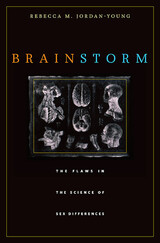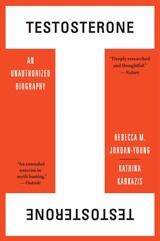
Female and male brains are different, thanks to hormones coursing through the brain before birth. That’s taught as fact in psychology textbooks, academic journals, and bestselling books. And these hardwired differences explain everything from sexual orientation to gender identity, to why there aren’t more women physicists or more stay-at-home dads.
In this compelling book, Rebecca Jordan-Young takes on the evidence that sex differences are hardwired into the brain. Analyzing virtually all published research that supports the claims of “human brain organization theory,” Jordan-Young reveals how often these studies fail the standards of science. Even if careful researchers point out the limits of their own studies, other researchers and journalists can easily ignore them because brain organization theory just sounds so right. But if a series of methodological weaknesses, questionable assumptions, inconsistent definitions, and enormous gaps between ambiguous findings and grand conclusions have accumulated through the years, then science isn’t scientific at all.
Elegantly written, this book argues passionately that the analysis of gender differences deserves far more rigorous, biologically sophisticated science. “The evidence for hormonal sex differentiation of the human brain better resembles a hodge-podge pile than a solid structure…Once we have cleared the rubble, we can begin to build newer, more scientific stories about human development.”

An Independent Publisher Book Awards Gold Medal Winner
A Progressive Book of the Year
A TechCrunch Favorite Read of the Year
“Deeply researched and thoughtful.”
—Nature
“An extended exercise in myth busting.”
—Outside
“A critique of both popular and scientific understandings of the hormone, and how they have been used to explain, or even defend, inequalities of power.”
—The Observer
Testosterone is a familiar villain, a ready culprit for everything from stock market crashes to the overrepresentation of men in prisons. But your testosterone level doesn’t actually predict your appetite for risk, sex drive, or athletic prowess. It isn’t the biological essence of manliness—in fact, it isn’t even a male sex hormone. So what is it, and how did we come to endow it with such superhuman powers?
T’s story begins when scientists first went looking for the chemical essence of masculinity. Over time, it provided a handy rationale for countless behaviors—from the boorish to the enviable. Testosterone focuses on what T does in six domains: reproduction, aggression, risk-taking, power, sports, and parenting, addressing heated debates like whether high-testosterone athletes have a natural advantage as well as disagreements over what it means to be a man or woman.
“This subtle, important book forces rethinking not just about one particular hormone but about the way the scientific process is embedded in social context.”
—Robert M. Sapolsky, author of Behave
“A beautifully written and important book. The authors present strong and persuasive arguments that demythologize and defetishize T as a molecule containing quasi-magical properties, or as exclusively related to masculinity and males.”
—Los Angeles Review of Books
“Provides fruitful ground for understanding what it means to be human, not as isolated physical bodies but as dynamic social beings.”
—Science
READERS
Browse our collection.
PUBLISHERS
See BiblioVault's publisher services.
STUDENT SERVICES
Files for college accessibility offices.
UChicago Accessibility Resources
home | accessibility | search | about | contact us
BiblioVault ® 2001 - 2024
The University of Chicago Press









